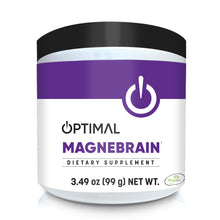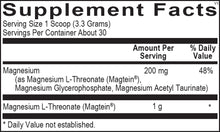- Description
- Benefits
- Supplement Facts
Clinical Applications
- Enhances Mental Focus and Clarity
- Improves Memory and Cognition in Those with Age-Related Memory Decline
- Improves Sleep Quality Including Time Spent in Deep and REM Sleep
- Supports Mental and Emotional Wellbeing
Magnesium is one of the most important minerals for human physiology, serving as a cofactor in over 300 enzymatic reactions. The 2013 NHANES found that 48% of the United States population consumed less than the recommended daily allowance for magnesium. Additionally, magnesium status can be negatively impacted by aging, certain health conditions, medications, exercise and diet choices.
A sufficient level of magnesium is essential for the health and function of the brain. Some of its most important functions are protecting the integrity of the blood brain barrier (BBB), serving as a cofactor for neurotransmitter synthesis, and modulating receptors. The transportation of magnesium into the brain is normally a restricted process due to the tight regulation of magnesium in blood.
In 2010, researchers at the Massachusetts Institute of Technology published their novel discovery of magnesium L-threonate, the only magnesium complex shown to specifically increase magnesium levels within the brain. High intraneuronal magnesium has been scientifically demonstrated to support neuroplasticity, cognitive function and improved quality of life through improved sleep, stress response and a balanced mood.
Magnebrain is the only formula on the market that delivers three brain-supporting forms of magnesium: magnesium L-threonate, magnesium glycerophosphate and magnesium acetyl taurinate.
These additional forms of magnesium enhance neurological mitochondrial ATP synthesis, increase antioxidant protection and reinforce the integrity of the phospholipid bilayer.
By offering three innovative forms of magnesium, Magnebrain is the unparalleled solution for brain and memory health.
Suggested Use:
Mix 1 scoop (3.3 grams) of Magnebrain Powder with water or the beverage of your choice once daily or as recommended by your health care professional.
Magnesium L-Threonate
Sleep Quality
Poor sleep affects 62% of adults worldwide. Insufficient magnesium intake and poor sleep have been correlated in several studies. Some mechanisms to explain the connection of poor sleep with inadequate magnesium are the ability of magnesium to bind gamma-aminobutyric acid (GABA) receptors, attenuation of the stress response or its role as a cofactor in melatonin synthesis. In a study of adults with sleep disturbances, 1g of magnesium L-threonate daily resulted in improved sleep quality and duration as confirmed by Oura ring data.
Mental-Emotional Health
A 2023 survey reports that 49% of adults in the United States report frequent stress. Symptoms of low mood and nervousness can occur independently of stress but are often experienced at the same time. In the brain, magnesium supports mood and emotional health by acting as a cofactor for the synthesis of dopamine and serotonin, inhibiting the release of excitatory glutamate and binding calming GABA receptors.
Memory and Concentration
Memory and mental focus are common patient concerns. In an animal model, magnesium L-threonate was found to increase the synaptic density and function of neurons in the brain. A decline in neuronal synapses, their function and consequent atrophy of the brain are associated with impaired cognition, a process that increases with age. In a study of older adults with memory concerns, those that received 1.5 to 2 g of magnesium L-threonate daily demonstrated improvement in executive function, working (short-term) memory and episodic memory.
Magnesium Acetyl Taurinate
Magnesium acetyl taurinate (MAT) was invented by magnesium research pioneer Professor Jean Durlach. MAT is a highly bioavailable form of magnesium with several brain-supporting properties. The acetyl group addition to the amino acid mineral chelate increases its solubility in lipophilic structures, like the brain.
The enhanced delivery of taurine into the brain via the acetyl group facilitates its beneficial neurological actions like preventing excessive excitatory activity through modulation of GABA, glycine, kainic acid and glutamate receptors, enhancing mitochondrial ATP production, increasing antioxidant protection and maintaining normal inflammatory balance. The lipophilic taurine of MAT has its own brain-supporting actions such as neuroprotection, supporting memory, balanced mood and normal cell regenerative processes.
Magnesium Glycerophosphate
Magnesium glycerophosphate (MG) is another magnesium complex with high bioavailability. In addition to delivering magnesium, the glycerol component of MG may have additional brain supporting actions. Glycerol has been found to act as a metabolic reserve for mitochondrial ATP production in neuronal tissue, especially in GABAergic neurons and the hippocampus. Additionally, glycerol serves as the backbone for phospholipid synthesis, a major component of neurological membranes in the central and peripheral nervous system.

Sign up for weekly offers, news and advice
Plus 15% off your first order

Free shipping for all orders over $125
- Choosing a selection results in a full page refresh.
- Press the space key then arrow keys to make a selection.






